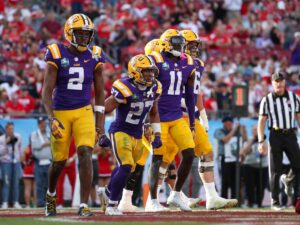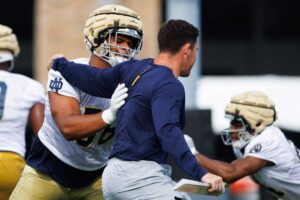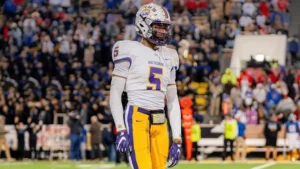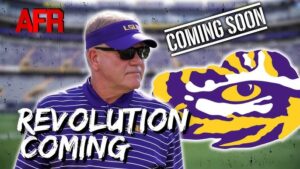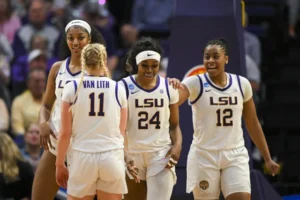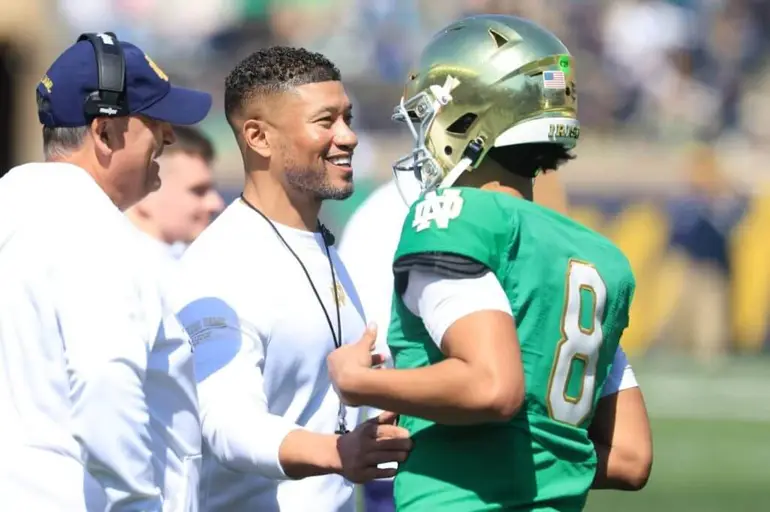
“Signal Change: What Steve Angeli’s Transfer Reveals About Notre Dame’s Quarterback Future and Offensive Philosophy”
When Steve Angeli announced his decision to enter the NCAA transfer portal, it didn’t exactly shake the college football world—but it did say a lot about where Notre Dame stands, where it’s going, and how the Irish are reimagining their quarterback identity.
Angeli, once a four-star recruit out of Bergen Catholic in New Jersey, was seen as a potential long-term solution under center in South Bend. Now, his departure underscores a much deeper shift happening within the Notre Dame program—one shaped by a blend of old-school roots and new-age expectations. Let’s break down what Angeli’s exit means and what it tells us about Marcus Freeman’s evolving quarterback philosophy.
Angeli’s Time at Notre Dame: A Case Study in Patience and Promise
To understand the implications of Angeli’s transfer, you have to first understand what Notre Dame saw in him.
At 6-foot-2 and over 210 pounds, Angeli was recruited as a smart, composed passer who rarely made big mistakes. He was efficient, if not electrifying, and appeared to be tailor-made for the conservative, methodical offenses Notre Dame favored under former coach Brian Kelly.
In many ways, Angeli represented the prototypical “program guy”—willing to wait his turn, absorb the system, and provide steady leadership when called upon. When he saw spot duty, including in the 2023 Gator Bowl win over South Carolina, he handled himself with poise. In limited action during the 2024 season, he displayed accuracy and command but didn’t necessarily leap off the screen with arm strength or improvisational flair.
Then came the transfer.
Why Angeli Left: Timing, Talent, and a Tight Window
While Angeli may not have been the most dynamic quarterback on Notre Dame’s depth chart, he was the most tenured. And yet, by the spring of 2025, it became clear the Irish were building their future around more explosive options.
Most notably, that includes early enrollee CJ Carr, the highly touted five-star recruit from Michigan. Carr’s arrival, coupled with the presence of Kenny Minchey—another young, promising signal-caller—meant the window for Angeli to start had not only closed, it may have never really been open.
Sources close to the program have suggested that Carr’s grasp of the offense and Minchey’s athleticism both stood out in spring practices. And in today’s college football environment, a quarterback with limited upside but plenty of experience is no longer considered enough. The rise of dual-threat quarterbacks and systems designed around improvisation and RPO (run-pass option) dynamics have changed the way coaches build their depth charts.
Angeli, a more traditional pocket passer, may have found himself misaligned with where Notre Dame is heading.
A Philosophical Shift Under Marcus Freeman
This isn’t just about Angeli. His transfer is emblematic of Marcus Freeman’s broader offensive transition.
Under Freeman, now entering his fourth year at the helm, Notre Dame has shown an increasing willingness to modernize its approach. That includes not just scheme, but personnel decisions that favor dynamic athletes who can make plays off-script.
Offensive coordinator Mike Denbrock’s return to South Bend has only accelerated that shift. Denbrock, who had success developing explosive offenses at Cincinnati and LSU, emphasizes tempo, mobility, and spacing—all elements that demand more from a quarterback than simply managing the game.
While Denbrock can adapt to a variety of quarterbacks, his best offenses have featured players like Desmond Ridder or Jayden Daniels—guys who could threaten defenses with both their arm and their legs. That’s not Angeli’s game. But it very much fits the mold of someone like CJ Carr, who brings polish, a quick release, and better-than-advertised mobility to the table.
The Carr Era Is Coming—Ready or Not
CJ Carr didn’t commit to Notre Dame to sit for long. And with Angeli now gone, the Irish are signaling their readiness to begin that transition sooner rather than later.
The grandson of former Michigan head coach Lloyd Carr, CJ has already impressed coaches with his football IQ and calm under pressure. He’s a natural leader, and while Freeman and Denbrock won’t rush him into the spotlight, the door is now wide open.
Notre Dame also now has a very clear pecking order in the quarterback room. Minchey will continue to push for reps, and the Irish may look to add a transfer for depth, but Carr’s rise is a key part of the program’s long-term blueprint.
This shift also reflects the increasing difficulty of “developing” a quarterback over three to four years in the modern college game. With the transfer portal constantly churning and NIL opportunities reshaping the timeline for success, the luxury of a slow-developing project like Angeli is harder to justify. Teams want playmakers now—and Carr offers more upside in that regard.
What It Means for Notre Dame Moving Forward
So what does this all say about Notre Dame’s quarterback future?
First, the Irish are done settling. Gone are the days of simply hoping a player like Angeli would gradually develop into a solid starter. Notre Dame wants difference-makers. Playmakers. Quarterbacks who elevate the team, not just steer it.
Second, it means the Irish are more willing than ever to hand the keys to a younger player, provided that player is ready. In past years, Notre Dame often leaned on experience, even if it came at the expense of athleticism or creativity. The staff’s approach now feels more aligned with the best programs in the country: Let talent win out.
Third, it reflects a national trend that Freeman is keen to keep pace with. Look across the College Football Playoff landscape in recent years—teams are led by quarterbacks who can run, throw, and take over a game when everything breaks down. That’s what Notre Dame wants. That’s what it needs.
A Note on Culture and Fit
That said, Angeli’s departure doesn’t mean he failed at Notre Dame. Far from it. By all accounts, he was a respected leader, a reliable teammate, and someone who represented the program with class.
Sometimes, a player simply isn’t the right fit for the system as it evolves. It’s not an indictment of his ability or effort—just a recognition of changing priorities.
Angeli will likely find a home where his strengths—accuracy, leadership, consistency—are valued. Somewhere that runs a more traditional offense, or one that needs a steadying presence in the QB room. And wherever he lands, he’ll be bringing years of elite coaching, maturity, and preparation with him.
A Necessary Turning Point
Steve Angeli’s transfer is not a headline-grabber in the way a five-star recruit flipping schools might be. But in terms of understanding the pulse of Notre Dame’s program, it’s incredibly revealing.
It tells us that Marcus Freeman and his staff are serious about taking Notre Dame’s offense into the next era. That they believe in their young stars. That they won’t hesitate to prioritize upside over experience. And that the standard at quarterback is changing—from dependable to dynamic.
Angeli, for all he did right, was a player built for a different version of Notre Dame football. The Irish are now charting a course that requires quarterbacks who can win games, not just avoid losing them. With CJ Carr on deck and the offensive philosophy shifting accordingly, Notre Dame’s identity under center is about to look very different—and potentially, very exciting.
The Angeli era never fully took off. But his departure clears the runway for what could be one of the most intriguing quarterback transitions in college football. And that, more than anything, is the story worth watching as the Irish look toward the 2025 season and beyond.
